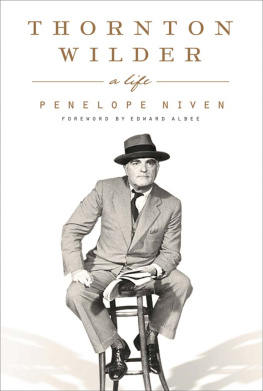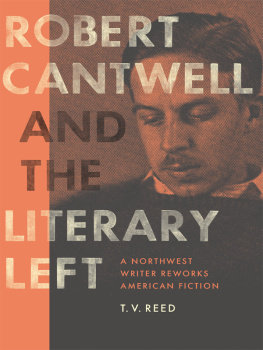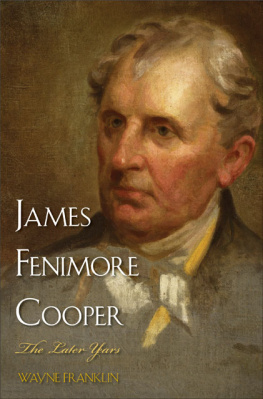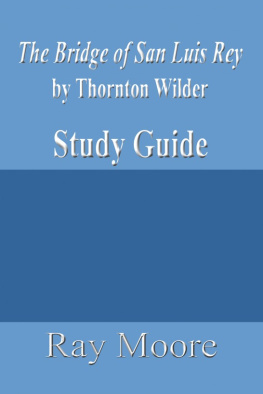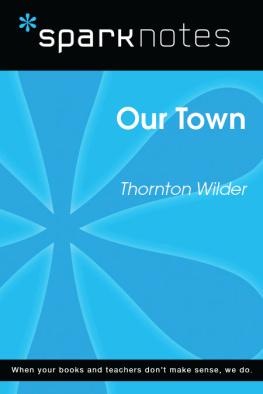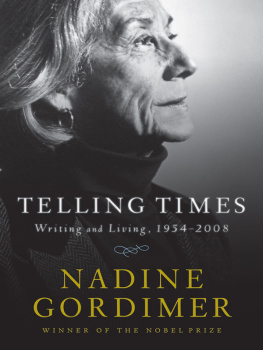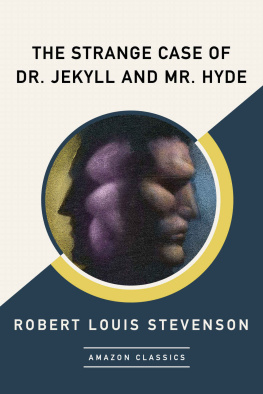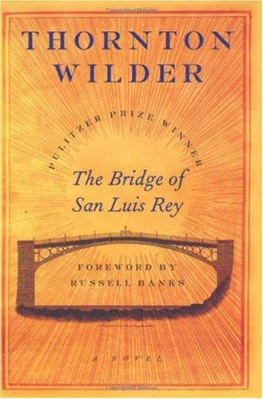
THORNTON WILDER
A Life
PENELOPE NIVEN
WITH A FOREWORD BY EDWARD ALBEE

To Jennifer, my daughter,
who shares the journey and lights the way
Art is confession; art is the secret told.... But art is not only the desire to tell ones secret; it is the desire to tell it and hide it at the same time. And the secret is nothing more than the whole drama of the inner life.
THORNTON WILDER,
On Reading the Great Letter Writers
How does one live? he asked the bright sky. What does one do first?
THORNTON WILDER,
The Woman of Andros
CONTENTS
W henever Im in a theater group and the discussion turns to the essential American playwrightsthe ones whose accomplishments define our cultureIm always startled and confused that Thornton Wilders name comes to the fore so infrequently.
Eugene ONeill is there, of course, in spite of his frequent tin ear. Long Days Journey into Night is a great play, perhaps the only one of his in which everything comes together fullythe mind and the earin a way the other best ones only occasionally approach.
Tennessee Williams is there, naturally, for the poetry of his language, the intensity of his dramatic structure, and the three-dimensionality of his characterizations.
Arthur Miller is included as well, as much as anything for the sociological and political importance of his dramatic concerns.
But why is Thornton Wilder so infrequently placed up there where he belongs?
If I were asked to name what I consider to be the finest serious American play, I would immediately say Our Town not for its giant Americanness but because it is a superbly written, gloriously observed, tough, and breathtaking statement of what it is to be alive, the wonder and hopeless loss of the space between birth and the grave.
While I prefer The Skin of Our Teeth another first-rate playto most of Wilders novels, he was no slouch there either.
This new biography of Wilder, comprehensive and wisely fashioned, gives us sufficient view of his methods, his public and private life, and the reaches of his mind to begin to understand with what intellectual and creative sourcings he was able to write so persuasively about things that greatly matter.
This book is a splendid and long-needed work.
A side note: I was a twenty-two-year-old very mediocre poet when I met Thornton Wilder at the MacDowell Colony. I forced my poetry on him. He read it and took me to a small lake where he plied me with bourbon and told me to stop writing poetry, that it was no good. He suggested perhaps I start writing plays instead.
I wonder if he knew that one day Id write forewords as well.
Edward Albee
New York City, 2011
The history of a writer is his search for his own subject, his myth-theme, hidden from him, but prepared for him in every hour of his life, his Gullivers Travels, his Robinson Crusoe.
THORNTON WILDER,
James Joyce, 18821941
W hen he was in his seventies, Thornton Niven Wilder wrote a story about an American teenager running alone through the countryside near the school in Chefoo, China, where he had been sent to live and study. The boy had sought special permission to run long distances by himself outside the China Inland Mission School boundaries, near the Bohai Sea. Awkward at the competitive team sports the other boys enjoyed, he was an outsider, a misfit in a crowd. He was most at home in books and his imagination, and these solitary runs freed him to think and to daydream.
This unfinished, unpublished self-portrait was a fusion of memory and imagination, fiction and fact. Already at that age I had the notion I would be a writer, Wilder reflected many years later, after he had written books and plays that resonated for countless people in the United States and around the world.
His history as a writer spans three-quarters of the twentieth century, and he left behind a tantalizing trail of evidencethousands of letters, journal entries, manuscript drafts, and documents that reveal his evolution as a person and an artist. Art is confession; art is the secret told... , he said when he was thirty-one and suddenly famous around the world as a novelist. But art is not only the desire to tell ones secret; it is the desire to tell it and hide it at the same time. And the secret is nothing more than the whole drama of the inner life. It is challenging enough for a biographer to attempt to do justice to the visible, exterior lifebut where to turn for revelation of the whole drama of the inner life?
Because of the magnitude of his surviving papersfrom childhood until his death in 1975we can witness close-up Wilders search for his own subject, his own myth-theme, his own true self. He left a richly detailed record of his lifelong education, much of it self-propelled. He left revealing portraits of his pivotal friendships and of his extraordinary family. This biography concentrates on his history as a writer and the drama of his inner life, but it is also a family saga, starring Thornton Wilder, with strong supporting roles played by his father, mother, and siblings.
He was a multifaceted manson, brother, student, teacher, scholar, novelist, playwright, actor, musician, soldier, man of letters, international public figure. He was also enigmatic, intensely private. A twinless twin, he was schooled in solitude, accustomed from boyhood to living in self-doubt and shadows. He belonged to a close-knit, complicated familytwo brilliant parents, five gifted children, and, for him, the specter of the twin brother lost at birth. From the year when he was nine until he was twenty-two, his family lived scattered around the globe, bound together by letters. Providentially most of those letters were saved after making the rounds from one parent or child on one continent to another parent or child oceans away.
The compelling evidence of Wilders life, public and private, is contained in thousands of his papers housed in the Yale Collection of American Literature at the Beinecke Rare Book and Manuscript Library at Yale University, as well as in countless other papers and documents released or discovered in the years since his death. His sister Isabel, the keeper of the flame, died in 1995 at the age of ninety-five. Until the end of her life she was working on her own book about her brother and their family, and so had withheld crucial papers, records, and photographsenough to fill nearly ninety bankers boxes. After her death, these resources went to the Beinecke Library as well. This uncataloged trove includes artifacts that ignite the imaginationthe mothers fading album of memories and dreams, kept when she was a teenager; the fathers worn brown leather diaries written in China; the familys passports stamped with ports of call around the world; and their intimate letters and papers.
When Tappan Wilder became the manager of his uncles literary estate, he opened additional resources to Wilder scholars and students, and on his watch many more papers have been discovered, released, and collected. There are papers and documents enough to keep a throng of biographers, scholars, and critics busy for at least the next few decades. This biography, the first to emerge from that vast archive, narrates Wilders life, private and public, and provides the history and context of his creative work, published and unpublished. This is not , however, a volume of literary criticism. The exhaustive documentation in the endnotes is a guide for readers, and may also be a compass for future students, scholars, and critics.
Just as Wilder took liberties with form and style in drama and fiction, he played with the mechanics of writing, especially punctuation. His letters and manuscripts were often animated with bold underscores in ink or colored pencil; with paragraph symbols; and with the equal signmore emphatic, he thought, than the ordinary colon. But because Wilder the writer was far more attentive to substance than to mechanics, and because he could be cavalier about spelling and punctuation, occasional silent corrections have been made. Otherwise, you will encounter Wilders words on the page exctly as he put them there. Thanks to the profusion of his letters and journals, and the generosity of his literary executor, much of Wilders story is told here in his own voice.
Next page
